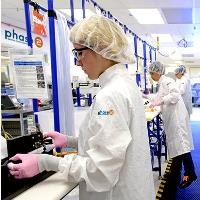(STRASBOURG) – The European Parliament gave its backing Wednesday to stricter rules on medical devices, to ensure that devices such as breast or hip implants are traceable and comply with EU patient safety requirements.
At their plenary session, MEPs also approved laws to tighten up information and ethical requirements for diagnostic medical devices, e.g. for pregnancy or DNA testing.
There are over 500,000 types of medical devices and in-vitro diagnostic medical devices on the EU market. Examples of medical devices are contact lenses, x-ray machines, pacemakers, breast implants and hip replacements and sticking plasters. In vitro diagnostic medical devices, which are used to perform tests on samples, include HIV blood tests, pregnancy tests and blood sugar monitoring systems for diabetics.
“The metal-on-metal hip scandal highlighted weaknesses in the current system,” said medical devices rapporteur Glenis Willmott MEP. “So we’ve introduced much stricter requirements for the bodies that authorise medical devices, and will insist that particularly high risk devices, such as implants, joint replacements or insulin pumps, be subject to additional expert assessments before they can be authorised.”
MEPs also agreed a stronger system of post-market surveillance, the aim being to identify and deal with any unexpected problems as soon as possible. “With the PIP breast implants scandal, many women simply didn’t know if they had received defective implants or not,” Ms Willmott added. “So we’ve also introduced a Unique Device Identification system to help trace patients, who will also be given an implant card, which they can use to access information via a publicly accessible database.”
The rules provide for:
- random inspections of producers’ facilities after devices have been placed on the market,
- stricter controls on notified bodies, which will have to employ medically skilled people,
- an additional safety checking procedure for high risk devices, such as implants or HIV tests. Not only a notified body, but also a special committee of experts, will check that all requirements are met,
- an “implant card” for patients, enabling patients and doctors to track which product has been implanted, and
- clinical evidence of medical device safety to be provided by manufacturers (as for medicines), especially in the case of higher risk classes.
A separate law will also ensure that the new rules also apply to in-vitro diagnostic medical devices, i.e. those that are not in direct contact with the patient, but provide health information, such as HIV, DNA or blood testing devices.
“We learned the lessons of scandals such as that of defective breast implants”, said rapporteur on in-vitro diagnostic medical devices Peter Liese MEP.
“Problems have occurred in other areas too, e.g. with stents that are implanted into the brain or unreliable HIV tests. The new regulation is good for patients, puts an end to fraudulent and shady producers and thus also strengthens respectable producers”, he added.
The legislation would also require EU member states to inform patients of the consequences of DNA tests.
“DNA tests can have severe consequences for patients’ lives and they should not be carried out without proper information and counselling. Member states pointed out that this is first of all their responsibility and that they will therefore accept EU rules only to a certain extent. It is important that member states fulfil this obligation. We will be very vigilant on this question”, said Mr Liese.
New EU rules to ensure safety of medical devices - background guide
Further information, European Parliament
Adopted text (2012/0266(COD); 2012/0267(COD)) will soon be available here (05.04.2017)
EP research: Medical devices and in vitro diagnostic medical devices



